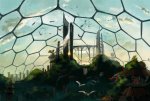Celebrim
Legend
I know. But this isn't a LotR thread.
You were the one who brought up Rivendell. I responded, in essence, that I didn't know what you meant by a "Rivendell style city" as even in most Tolkien inspired art - which often has only a loose resemblance to the text - Rivendell is not depicted as a city. Nor for that matter is there a lot of uniformity on what Rivendell looks like, except for, as I mentioned, the waterfalls flowing through the house's foundation seems to have become a trope. So I'm not even necessarily clear on what a city of buildings built in the Rivendell style would look like, other than again, waterfalls. And in any event, I suspect Rivendell style however much sense it makes for Tolkien elves in that time and place, doesn't make a lot of sense for D&D elves. The manor house is a product of a very lawful, socially stratified culture, living together communally, in very tight quarters. This doesn't make a lot of sense as the normal mode of civics for a chaotic freedom loving highly individualized culture built around self-expression, even if they are 'high elves'.
In general, I expect whatever a city looks like, it will be an entity that exists for largely economic reasons built somewhere that makes economic sense. Thus, it may be the case that the elves lavish decoration and adornment on whatever they build, but I can't foresee them building anything they don't actually need. Your typical painted elven city seems to have a lot of buildings with no function, and no examples of buildings fulfilling necessary functions like smithies, mills, barns, apiaries, breweries, etc. Even though I have a low agricultural model in mind, if they are going to have a city actually disrupting the landscape, I'd expect to see vineyards, greenhouses, mills, chimney's, barns, etc.
Except: magic.
If you are going to invoke magic in the construction of a city, I think you are well served to go ahead and be more overt about it. Magic is a very expensive solution to mundane problems. To the extent that the elves are going to invoke magic to solve real problems, I suspect it has more to do with gathering firewood than preventing ordinary erosion. It's not like a chaotic species is going to be rigidly opposed to change and evolution.
Again, a city is something you build because you need it. Typically what passes for an elven city in paintings has so much unneeded vertical space you'd have to build an elevator to use it, raising the question of why you'd build straight up despite low population density. It has waterfalls pouring off the very tops of mountains or out of treetops in defiance of logic, and running through the foundations of the building were they'd erode and eventually destroy the structure. It has buildings with no clear function and often no clear means of egress or even no obvious usable space (in the case of buildings that aren't decorated with spires, but seem to be made entirely out of spires).
It might look good as a painting (though that's debatable) but I think it has no place in an RPG. 'Elfish architecture' is right up there with fluted pointy plate mail and chain mail bikini's in terms of my appreciation for it.
Because fantasy worlds often bear very large resemblance to the real world, the sort of adaptations that one is going to expect to see living in a fantasy world are going to be quite similar to what you'd see in the real world. So while you might rely on diverse ideas from medieval Wales, Japan, Ireland, northern India, Shaker Villages, and the American Craftsman movement to get ideas for how elves might build things, I wouldn't expect that in their basics the elves will be doing anything too radically different than what humans somewhere have done. Humans have built cave cities. They've built things out of the living branches of trees. The difference with elves would probably be only a matter of degree, not kind.

